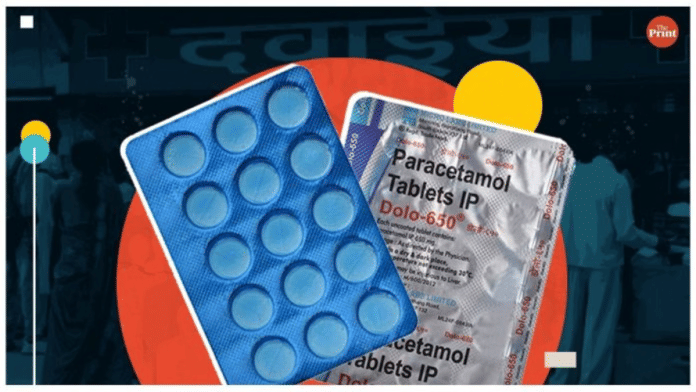New Delhi: Physicians in the United States will soon be advised not to prescribe common pain-reliever and anti-fever medicine Tylenol to pregnant women, President Donald Trump announced Monday, citing what is being seen as its “unscientific” links with some neurological disorders in children.
Tylenol is a popular brand by Kenvue, a spin-off of US-based pharmaceutical giant Johnson & Johnson, which has acetaminophen or paracetamol as its Active Pharmaceutical Ingredient (APIs). It is a drug approved for over-the-counter (OTC) sale in the country and also the only OTC drug for fever in pregnant women.
The US president claimed that taking Tylenol, simply known as paracetamol in most countries, “is no good” and that pregnant women should “fight like hell” to only take it in cases of extreme fever.
The same day, the country’s apex drug regulator US Food and Drug Administration (FDA) also initiated the process for a label change for acetaminophen to reflect evidence suggesting that the use of acetaminophen by pregnant women may be associated with an increased risk of neurological conditions such as autism and ADHD (attention deficit/ hyperactivity disorder) in children.
The regulator also issued a related letter alerting physicians nationwide. The precautionary principle may lead many to avoid using acetaminophen during pregnancy, especially since most low-grade fevers don’t require treatment, it said, also adding that it remains reasonable, however, for pregnant women to use acetaminophen in “certain scenarios”.
According to the details shared by the FDA, evidence in recent years has suggested a correlation between acetaminophen usage during pregnancy and subsequent diagnosis of conditions like autism-developmental disorder affecting social communication, interaction, and behavior; and ADHD, characterised by persistent patterns of inattention, hyperactivity or impulsivity.
The FDA, in its statement, cited some large-scale cohort studies, including the Nurses’ Health Study II and the Boston Birth Cohort, saying that these have found association between acetaminophen and these neuro-development disorders.
But the statement also clarified that “it is important to note that while an association between acetaminophen and neurological conditions has been described in many studies, a causal relationship has not been established and there are contrary studies in the scientific literature”.
Also Read: Trump’s claim linking autism to Tylenol use by pregnant women sparks debate
No robust evidence
But pharmacologists and medical experts across countries, including in India, have vehemently pushed back on the claims, with some calling the president’s comments dangerous.
“What the US president implies by vilifying acetaminophen is not fully backed by robust scientific evidence and is an oversimplification of several and complex causes of neurologic challenges in children,” a senior AllMS-Delhi pharmacologist-researcher, who is also part of several committees at the Central Drugs Standard Control Organisation, told ThePrint.
“In fact studies that have been conducted in the past, have thrown no clear evidence proving a direct relationship between the rational use of acetaminophen during any trimester and fetal developmental issues and it is one of the safest medicine even during pregnancy,” said the pharmacologist-researcher, who did not wish to be named.
First made in the second half of the 19th century, paracetamol is a non-opioid analgesic (pain-reliever) and antipyretic (anti-fever) agent used in treating fever and mild to moderate pain. It is among the most used OTCs worldwide.
Since the 1950s, its usage has become widespread particularly as its safety was established and physicians in many countries freely prescribed it, say experts.
According to Dr Rajesh Kumar, associate director-internal medicine, Paras Health in Gurugram, while paracetamol is generally safe when taken in the recommended dosage, problems can occur if it is overused or combined with other medicines containing acetaminophen.
“Since the liver is responsible for processing it, excessive intake may lead to liver damage or even liver failure in severe cases,” he underlined.
Early symptoms of overuse include nausea, vomiting, loss of appetite, abdominal pain, fatigue, or confusion, and in advanced cases, yellowing of the skin or eyes (jaundice) may appear. Long-term misuse, especially when combined with alcohol, can significantly increase the risk of liver injury.
However, said experts, there is no clinching evidence, as yet, linking the medicine with rising cases of autism and ADHD- which are typically associated with genetic and environmental factors.
In August, a review of research led by the dean of Harvard University’s Chan School of Public Health had indicated that kids may be more likely to develop autism and other neurodevelopmental disorders when exposed to Tylenol during pregnancy.
This review was based on 46 studies, 27 of which had identified a positive link between taking Tylenol and children developing neurodevelopmental disorders. Based on this, researchers had argued some steps should be taken to limit use of the drug, but said it was still important for treating maternal fever and pain.
Many studies in this review, however, have been criticised for confounding bias or a systematic distortion in the measure of association between exposure and the health outcome due to mixing of the effect of the exposure of primary interest with external risk factors.
“It’s important to remember that these findings come from observational studies. Such studies can show links but cannot prove that one thing causes another. In fact, sibling-control studies, which compare outcomes between exposed and non-exposed siblings, have not found any significant increase in risk,” underlined Dr Tripti Raheja, director, obstetrics & gynaecology at the CK Birla Hospital in Delhi.
Also, another study, published in 2024, pointed out Dr Santanu Tripathi, a clinical pharmacologist and a former CDSCO panel member, had found no relationship between exposure to Tylenol and autism.
This study was conducted by looking at a population sample of 2.4 million children born in Sweden between 1995 to 2019.
“Although there are some concerns among people, I believe the available data and evidence are insufficient and certainly not strong enough to suggest a causal association between paracetamol use by pregnant women and birth of babies with autism spectrum disorder,” said Dr Tripathi.
(Edited by Ajeet Tiwari)
Also Read: How desi Dolo became India’s favoured paracetamol brand in pandemic, beat global pharma giants






